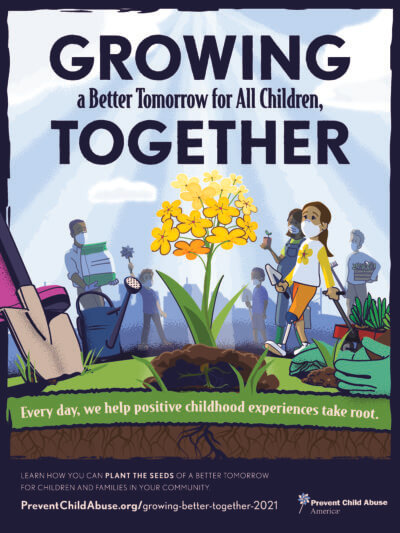Ever since April was designated as National Child Abuse Prevention (CAP) Month in 1983, Prevent Child Abuse America (PCA America) and its nationwide network of state chapters, along with other child welfare organizations, have recognized it as a time to raise awareness and inspire collective action, so that our country’s children can lead their best lives.
What is Child Abuse Prevention Month?
Many innovative strategies are employed to promote National Child Abuse Prevention Month. Events and activities have included everything from kid’s art contests to coordinated visits to state legislators and days of prayer. Many of our PCA America state chapters have created guides with suggestions to help with social media campaigns, creating community programs, and much more. Check out these Child Abuse Prevention Month toolkits from Kansas, North Carolina, and Virginia.
 This year’s national campaign theme is “Every day, we help positive childhood experience take root!” We encourage our chapters, affiliates, and stakeholders to use a garden metaphor to reinforce this message. Here are some talking points to use as examples:
This year’s national campaign theme is “Every day, we help positive childhood experience take root!” We encourage our chapters, affiliates, and stakeholders to use a garden metaphor to reinforce this message. Here are some talking points to use as examples:
- Children are locally grown. We work together to cultivate relationships, connections, and environments that help every child thrive.
- We harvest what we sow. We plant seeds of support for all children to yield healthier adults with abundant futures.
- Work is rooted in science. We know positive childhood experiences in nurturing environments provide fertile ground for physical and mental health, learning, and social skills to flourish. We unearth the possibilities. We focus on innovation every day to give every child what they need and to build bountiful, safe communities.
- Planning and purpose create common ground. We share resources equitably, expand access to services, and balance conditions for positive childhood experiences to enrich every community.
- We tend and replenish the soil. We offer homegrown solutions and hardy support to protect what we grow in all elements.
- Hope and commitment are powerful fertilizers. We combine the promise of a better tomorrow with our resolve to nourish all children and their families in every season.
What Are Some Effects of Child Abuse and Neglect?
Child Abuse Prevention Month was created because child abuse and neglect was both widespread and too often invisible. “Our children are our future” may be a cliche, but it’s still true that the more adults can have a positive impact on a child’s experiences, the stronger society will be. A safe, stable, and nurturing environment can have a proven positive effect on brain development. Research shows that children who suffer from the prolonged stress of abuse and neglect tend to struggle in their behavioral, physical, and cognitive abilities. The effects of early trauma tend to continue through generations. In contrast, experiencing support in early childhood can prevent or even reverse the damaging effects of early life stress, with lifelong benefits for a young person’s learning, behavior, and health. Whatever seeds have been planted, or not planted, will affect a person’s health, ability to learn, and ultimately, earning power.
Child abuse and neglect doesn’t stem from just one cause, which is why stopping its destructive cycle is so difficult. Living in a community with a high rate of violence, limited access to social services, poverty, and unemployment are all major factors. Addressing community needs by giving families support has much more impact, and costs much less, than attempting to address the consequences of adversity after a child has grown up.
What Can Be Done?
Increased awareness and collective action is a key factor in conquering child abuse and neglect. These strategies are the mission of Child Abuse Prevention Month every year. PCA’s Georgia chapter has several suggestions about specific tactics that could help:
- Business leaders can recognize that supporting families and children will lead to economic growth.
- Policymakers can reduce the hurdles faced by families who need support and resources.
- Faith communities can open up their spaces for parent and youth activities.
- Organizations that host families and young people can train staff on how to recognize, respond to, and prevent child abuse and neglect.
- Educators can be more attuned to noticing if something seems wrong with a student and follow-up
- Friends and neighbors can pay closer attention and help with the social isolation some parents may experience.
- Anyone who thinks a parent should seek support can share the 1-800-CHILDREN (244-5373) Helpline number.
Learn how you can plant the seeds of a better tomorrow for children and families in your community by visiting the CAP Month web page below:



